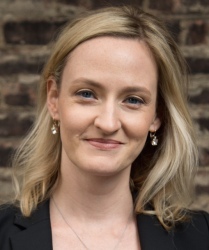A Healthy Suspicion of Conventional Wisdom

Guest Post by Asha Curran, Chief Innovation Officer and Director for the Belfer Center for Innovation & Social Impact at the 92nd Street Y
We’re bringing Asha Curran to Kansas City on September 15 to discuss lessons learned in nonprofit innovation! Click here to learn more and save your seat.
The author Simon Sinek theorizes that businesses can often articulate the what and the how of what they do, but cannot as often articulate the why. In the nonprofit world, I believe we often have the opposite challenge: our sense of purpose is very strong, our work driven by our belief in our mission, but our processes and systems can become repetitive and uninspired. The word "innovation" has become overused jargon, but for me the word calls to mind all of the things that can happen--the collaborations, the ideas, the alchemy--when we get ourselves out of those ruts.
Examining and changing our institutional habits is one of the hardest things to do, but progress is impossible without it. It's a safe assumption that we are all familiar with the "we do it this way because we've always done it this way" mindset. It's a fundamentally useless, even toxic, one. It's not that we need to get rid of products or habits or practices just because we're used to them, but it's not a good enough reason to keep them around, either. And the bandwidth we use up on repeating and maintaining outmoded practices is bandwidth we could be devoting to creativity and experimentation.
It's wonderful to be an expert in a particular area and to know our subject backwards and forwards, with the buzzwords to match, but innovation happens when we allow ourselves to experiment outside of our core competencies.
When we began #GivingTuesday in 2012, we were stepping firmly out of our comfort zones. The movement was born at the 92nd Street Y, which is a cultural center that has served a mostly local community for a century and a half. We do many things, including running a world-class lecture program and concert series, a nursery school, a senior center and more, serving people at all stages of their lives; but starting social-media-driven global giving movements has not traditionally been one of them. We reexamined our assumptions around the amount of scale an organization like ours could aspire to achieve. We reexamined our use of technology and new media and how aspirational we wanted to be in leveraging it to make good things happen.
I believe that the fact that we were stepping into totally new territory was entirely to the benefit of the movement. We were hungry to learn, and we built a coalition of forward-thinking people from the tech, philanthropy, business, and academic worlds to ask them for advice--and to build the movement with us. And it led to a cascade of other ideas and a reworking of the way we cultivate those ideas, internally and with partners.
In a rapidly changing philanthropic/digital/data landscape, we should be even more deeply suspicious of doing things a certain because they have always been done that way, a phenomenon that often goes by the noble-sounding "conventional wisdom." Conventional wisdom, for example, would have told us that a day of giving falling after Cyber Monday would cannibalize end of year giving. All the data we have so far tells us otherwise. It has upended conventional wisdom in numerous other ways, as well. And if #GivingTuesday could be the exception to seeming statements of fact in the nonprofit world, what else could be? What great new ideas, movements, and partnerships are being left on the table as we focus on the old ones?

